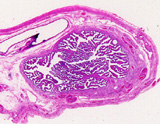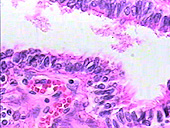 Oviducts
(uterine tubes or Fallopian tubes) -- bilateral, first part of
genital tract; site of fertilization and transport of early embryo
to uterus. Oviducts
(uterine tubes or Fallopian tubes) -- bilateral, first part of
genital tract; site of fertilization and transport of early embryo
to uterus.Examine sections of
the oviduct (slides 19 and
60) and identify the mesentery, highly vascularized serosa, and the well-developed muscularis, and the very
highly folded mucosa (Fig. 22-13).
- Based on the diagram in Fig.
22-12, what region of the oviduct is shown in your specimen?

Examine the simple columnar
epithelium at higher power and note the presence of two cell types:
- Ciliated cells and
- Slightly taller non-ciliated
secretory cells (Fig. 22-13).
What are the functions of the
cells lining this region of the oviduct?
Examine the section of oviduct on
slide 59 and note the differences from that on
slide 60.
What region of the oviduct does
this section represent?
In which region of the oviduct
does fertilization normally occur and how does the structure of the
tube at this level facilitate this process?
Now for the
uterus. |